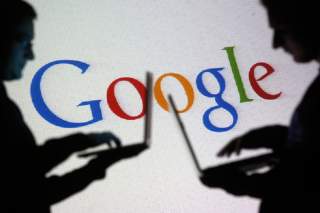Trump Admin to Supreme Court: Don't Save Google From Copyright Suit
Google is playing defense.
-
The Trump administration is urging the Supreme Court to stay out of a years-long copyright dispute between tech giants Google and Oracle.
-
Oracle said Google impermissibly copied its computer code to build its Android operating system, which services more than 2 billion smartphones.
-
Google is facing a damages award that could total $8 billion.
The Trump administration urged the Supreme Court to stay out of a long-running copyright dispute between Google and Oracle Corp., dealing a considerable blow to Google’s efforts to avoid an $8 billion damages award.
At issue in the dispute, billed as the copyright fight of the decade, are software interfaces called API declarations, which are shorthand commands that facilitate prewritten complex computer functions. Google used a trove of Oracle-owned Java API declarations when building its Android smartphone operating system.
“[Google] copied 11,500 lines of computer code verbatim, as well as the complex structure and organization inherent in that code, in order to help its competing commercial product,” the Trump administration’s brief reads. “The record demonstrates, moreover, that [Google’s] unauthorized copying harmed the market for [Oracle’s] Java platform.”
Sun Microsystems originally developed the contested API declarations. Oracle acquired Sun in 2010. Shortly thereafter, Oracle sued Google in federal court for patent and copyright infringement, saying Google impermissibly copied the API declarations. Years of litigation followed.
Now before the Supreme Court, Google questions whether APIs are copyrightable in the first place. The federal Copyright Act provides that protection does not extend to “methods of operation.” In Google’s view, APIs are a method of operation because they help developers access prewritten complex functions.
“The Java API declarations simply tell developers how to access the prewritten methods to perform tasks carried out by the implementing code,” Google’s petition reads. “In that respect, the declarations are analogous to a set of rules developers are trained to follow when writing programs in the Java language. If the rules were changed, the prewritten methods would not work. For that reason, the declarations are necessarily part of the method of operating the libraries of prewritten code.”
The Trump administration disagreed, saying APIs do not count as a method of operation simply because they perform a function.
“Although there is a sense in which all computer code could be described as a method of operating a computer, the Copyright Act as a whole makes clear that computer programs can be protected by copyright, refuting any suggestion that the functional character of computer code suffices to bring it within [the Copyright Act],” the government’s brief reads.
The Supreme Court gives the federal government’s views great credence when, as here, the justices ask for its guidance about whether to take a case. However, Google contends the federal appeals courts are split as to whether copyright protections reach software interfaces like APIs. The justices are much more likely to take case featuring a question of law over which multiple courts disagree.
Google prevailed at the case’s first trial in 2012. A jury deadlocked over Oracle’s claims, prompting the judge to sign with Google. The U.S. Court of Appeals for the Federal Circuit, a specialized court for patent appeals, reversed that decision and ordered a new trial in 2014. Google appealed the Federal Circuit’s ruling to the Supreme Court, but the justices turned the request down in 2015.
A second trial followed in 2016. A jury sided with Google, finding fair use protected its reliance on the API declarations. The Federal Circuit overturned that verdict, ruling Google had not engaged in fair use. They returned the case to a lower court for a trial on damages. That decision is now pending before the Supreme Court. The justices asked the Trump administration to weigh in on the petition on April 29.
The case is No. 18-956 Google v. Oracle America.
Content created by The Daily Caller News Foundation is available without charge to any eligible news publisher that can provide a large audience. For licensing opportunities of our original content, please contact [email protected].
Image: Reuters.

